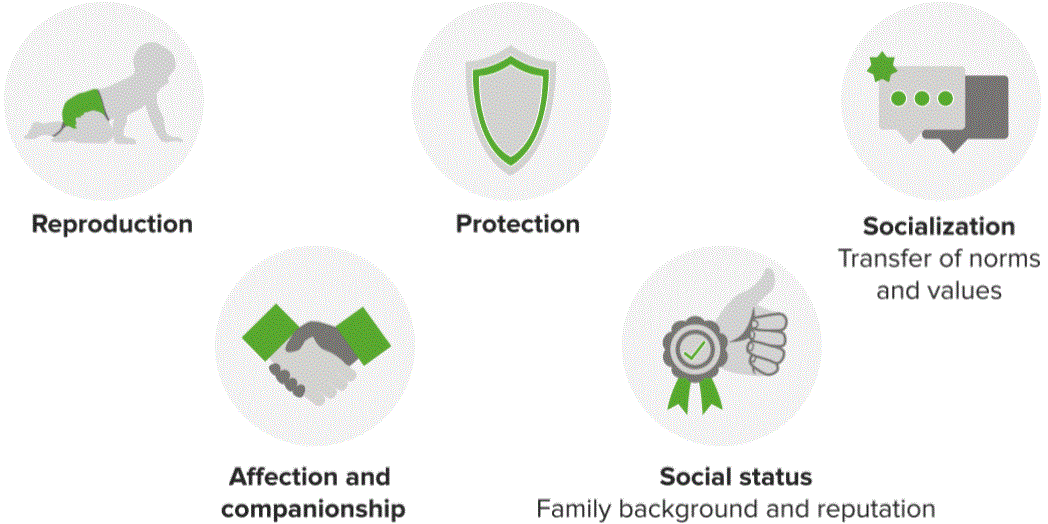Playlist
Show Playlist
Hide Playlist
Government and Economy – Social Institutions (SOC)
-
Slides Social Institutions UnderstandingSocialStructure.pdf
-
Reference List Psychology and Sociology.pdf
-
Download Lecture Overview
00:00 Now, the government and economy are also an important institutions. 00:04 So government are institutions that have responsibility to make, enforce and regulate the rules of society. 00:09 So in a governing body is extremely important and they do have a lot of power but they also have a lot responsibility. But how they’re set up and how they are executed is where they differ. 00:23 Power of the people versus the government. 00:25 So, democracy is one way in which all citizens participate in the government and society can choose their officials. 00:32 Democracy be most in North America, most of Europe where people get to vote. Who do we want in an office. Are we voting for this president? or are we voting for that president? Are we going to vote for Hillary or are we going to go with Donald Trump? Now, what happens is people have a say in who they are going to choose to run their country. 00:51 Another option is Authoritarianism. 00:53 And this is where citizens have no right or power to participate in government. 00:57 They’re pretty much told what to do. An example of that would be dictatorship or all the power and authority rests with one individual. 01:03 So the citizens of that community basically show up and do what they’re told and the dictator decides these are the laws, these is what we have to do. 01:13 Communism is another option. 01:15 And here it’s class-less. so there's upper class, middle class or lower class there's just a class-less system. It’s a money less system where all their properties own by the community as a whole and the government has considerable power and authority. 01:28 So you don’t have a lot of say your kind again do what you’re told. 01:32 but then there's also removal of some responsibility. You don’t have to work exceptionally hard to do and to gain all of this status. 01:41 instead everybody is considered an equal kind of it doesn’t matter whether you’re a doctor or whether you’re a janitor or whether you’re a lawyer, whether you’re a shoe salesman. You are going to be on the same level and it’s positives are that everybody doesn’t have to worry about things like wealth and estate and property. 02:01 The last option that we’re going to mention here is Monarchy. 02:05 And this is with the one family having control and power over the government with an appointed figurehead. 02:11 So the example that we have is in the UK. We have the British monarchy. 02:15 And we have the queen as the figurehead, and the family sort of at least in the past had more power than it does today. 02:26 But nevertheless, it’s a family that runs everything as supposed to see just one individual or instead of the community voting in a governing body to run their country. 02:38 Okay, so let’s take a look at two economic platforms. 02:42 One is a Capitalistic Platform or Capitalism we called it. 02:45 and this is an economic system in which resources and productions are primarily privately owned versus socialist to stance where there is an economic system in which resources and productions are collectively owned. 03:00 So when a Capitalistic society, you can own property, you can own a business, you can own a house, you can own a car, you can attain and gain wealth. 03:11 As opposed to a Socialistic Society, the resources and productions are collectively owned by the community or the whole country. 03:21 So in a Capitalistic society, goods and services are sold for profit. 03:25 And in socialistic society private property is limited. 03:28 it’s owned by usually the governing body. 03:31 So two different systems, two different complete stances and you can see the differences there. 03:41 Now, let’s get into when we are in the community where everybody has a task or job or a role. 03:48 We say that division of labor refers to the notion that everyone in the society has a specific role to play. 03:54 I mean that can range from anything and it can range from being a blue color worker to being a professional, to being a sports star or celebrity. 04:03 But there's an issue with that because I think you and I both know, there is this huge disparity or this huge almost injustice where teachers are making moderate wages and we have athletes making millions and millions of dollars a year. 04:19 So they have a role to play, everybody has a role to play. 04:23 I think what happens in a capitalistic society is that some of the wages earn by each becomes slightly a skew.
About the Lecture
The lecture Government and Economy – Social Institutions (SOC) by Tarry Ahuja, PhD is from the course Understanding Social Structure.
Included Quiz Questions
What is a characteristic of the present-day French government?
- Society chooses its officials.
- Citizens lack the right to participate.
- A family manages state affairs.
- Property is community-owned.
- A figurehead manages state affairs.
What type of government did ancient Egypt have during the time the pyramids were built?
- Monarchy
- Dictatorship
- Democracy
- Autocracy
- Oligarchy
On a small scale, what type of system does a neighborhood garden resemble?
- Socialism
- Democracy
- Capitalism
- Authoritarianism
- Financial independence
Customer reviews
5,0 of 5 stars
| 5 Stars |
|
5 |
| 4 Stars |
|
0 |
| 3 Stars |
|
0 |
| 2 Stars |
|
0 |
| 1 Star |
|
0 |




